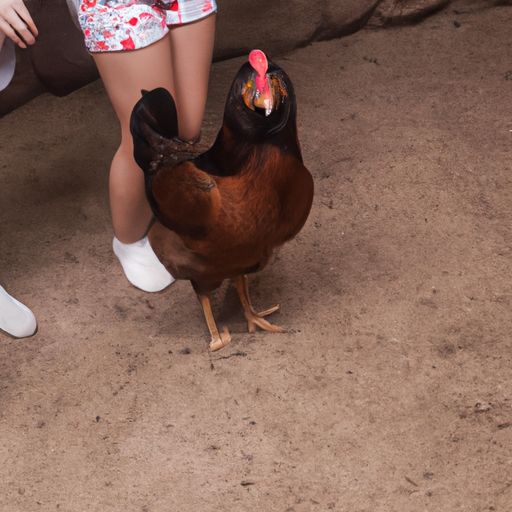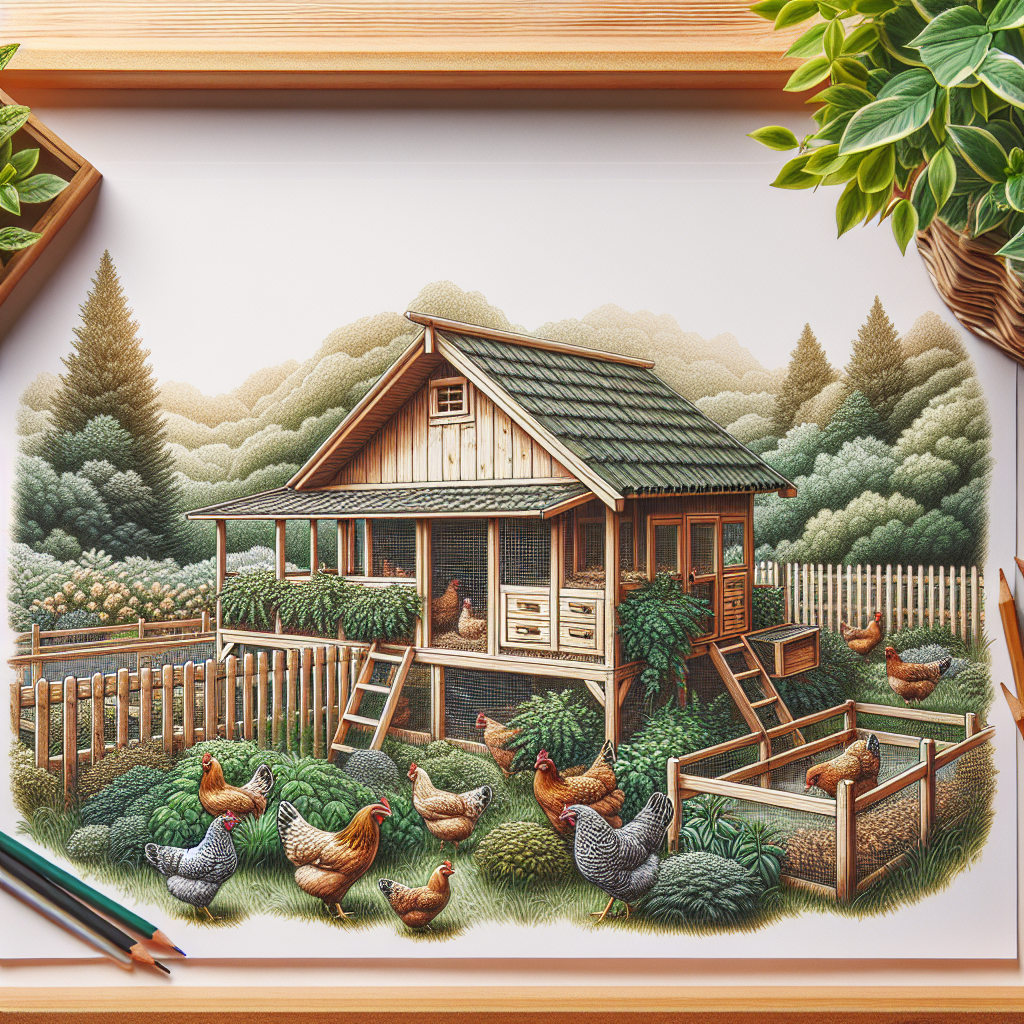So you’ve decided to embrace the joys of backyard chicken keeping, but now the question arises: how do you ensure the health and well-being of your feathered friends? In this article, we will explore the routine checks that you should perform on your chickens to catch any signs of illness before they become serious. From observing their behavior and posture to checking their feathers and droppings, these simple yet vital checks will help to keep your chickens healthy and happy. Let’s dive in and discover the key to early illness detection for your beloved flock.
Checking Their Overall Appearance
Checking for changes in feathers or skin condition
One important aspect of monitoring your chickens’ health is to regularly check for any changes in their feathers or skin condition. Be on the lookout for signs of feather loss, pecking, or abnormalities such as patches of bare skin or matted feathers. Additionally, inspect their skin for any redness, swelling, irritations, or lesions. These can be indicators of potential health issues that require attention.
Observing body posture and behavior
Another crucial aspect of assessing your chickens’ health is to observe their body posture and behavior. Pay attention to how they carry themselves – a healthy chicken should have an upright and alert posture. If you notice any hunching, lethargy, or unusual behavior such as staying away from the flock, it could signal an underlying health problem. Keep an eye out for any signs of discomfort, distress, or changes in their normal routine.
Monitoring Their Appetite and Thirst
Noticing changes in feed consumption
To ensure your chickens’ well-being, it’s important to monitor their appetite. Keep track of how much feed they consume on a daily basis. A sudden decrease in their usual eating habits may indicate an underlying health issue. Conversely, a significant increase in feed consumption could also be a cause for concern. Changes in appetite can be early signs of various illnesses, so it’s crucial to stay aware and take note of any significant deviations from their regular eating patterns.
Checking water intake levels
Alongside monitoring their feed consumption, it’s equally essential to keep an eye on their water intake levels. Dehydration can be a serious issue for chickens, so it’s important to ensure they have access to clean and fresh water at all times. Observe if there are any noticeable changes in their drinking habits, such as increased or decreased water consumption. Any significant alterations in their water intake should be investigated further to rule out any potential health problems.
Inspecting Droppings
Examining color, consistency, and odor
Regularly inspecting your chickens’ droppings can provide valuable insights into their overall health. Pay attention to the color, consistency, and odor of their droppings. Healthy chickens typically have firm, well-formed droppings that are dark brown in color. Any drastic changes in color, such as yellow, green, or black, could indicate gastrointestinal issues or infections. Similarly, if you notice watery or excessively dry droppings, it may be a sign of an underlying health problem. Additionally, foul or unusually strong odors can also signify potential health concerns.
Detecting any abnormal objects
During the inspection of your chickens’ droppings, be vigilant for the presence of any abnormal objects. Sometimes, chickens may ingest foreign materials, such as rocks or pieces of plastic, which can cause digestive issues or blockage. If you notice any unusual objects in their droppings, it’s important to take immediate action and consult a veterinarian if necessary.
Examining Eyes, Comb, and Wattles
Checking for redness, swelling, or discharge
When assessing your chickens’ health, it’s crucial to regularly examine their eyes, comb, and wattles. These areas can provide important clues about their overall well-being. Look for any signs of redness, swelling, or discharge in their eyes. These may indicate infections, allergies, or other eye-related issues.
Observing any changes in size or color
In addition to checking for redness and discharge, pay attention to any changes in the size or color of their eyes, comb, or wattles. Eyes that appear sunken or larger than usual could indicate dehydration or other health concerns. Similarly, any changes in the color of their comb and wattles, such as paleness or darkening, may be indicative of underlying health issues. Regularly monitoring these areas can help detect potential problems before they worsen.
Assessing Breathing and Sound
Listening for wheezing, coughing, or gasping
A key aspect of monitoring your chickens’ health is assessing their breathing and sound. Listen closely for any wheezing, coughing, or gasping sounds. These can be indications of respiratory infections, allergies, or other respiratory issues. Respiratory problems must be addressed promptly to prevent further complications and ensure the overall well-being of your flock.
Checking for abnormal vocalizations
Apart from assessing their breathing, pay attention to their vocalizations. Chickens typically have a range of sounds they make, but any sudden changes or abnormal vocalizations could signify potential health concerns. Excessive, wheezy, or weak vocalizations should be investigated further to determine the underlying cause.
Observing Their Movement and Balance
Noticing limping or difficulty moving
Regularly observing your chickens’ movement and balance can help you identify any issues with their musculoskeletal health. Be on the lookout for any signs of limping, favoring a particular leg, or having difficulty walking or standing. These symptoms may indicate injuries, infections, or conditions such as bumblefoot that require attention.
Watching for loss of balance or coordination
In addition to monitoring their movement, it’s crucial to watch for any signs of loss of balance or coordination. If you notice chickens stumbling, falling over, or displaying unsteady movements, it could be a sign of neurological problems, vitamin deficiencies, or other health issues affecting their balance and coordination.
Inspecting Their Vent
Checking for any signs of diarrhea or blockage
Inspecting your chickens’ vents is an important aspect of their health assessment. A healthy vent should be clean and free from any signs of diarrhea or blockage. Diarrhea can be an indication of various health problems, including infections or dietary issues. On the other hand, a blocked vent can lead to serious complications and discomfort for your chickens. Regularly monitor their vents and consult a veterinarian if you notice any abnormalities.
Assessing cleanliness and swelling
In addition to checking for diarrhea or blockage, assess the cleanliness and swelling of their vents. A clean and dry vent is indicative of good hygiene and can help prevent infections. Any signs of swelling, redness, or discharge should be investigated further, as they can be symptoms of underlying health issues that warrant attention.
Assessing Egg Production
Monitoring changes in egg laying frequency
If you have laying hens, it’s important to keep track of their egg production. Monitor any changes in the frequency of egg laying. A sudden decrease in egg production or irregularities in their laying patterns could indicate health issues such as stress, nutritional deficiencies, or reproductive problems. Maintaining a record of their laying habits can help you identify potential health concerns early on and seek appropriate advice.
Checking egg quality and abnormalities
Apart from monitoring egg production, pay attention to the quality and appearance of the eggs themselves. Examine the size, shape, shell quality, and color of the eggs. Abnormalities such as soft or misshapen shells, rough textures, or unusual colors can indicate nutritional deficiencies or reproductive disorders. Regularly assessing these aspects can give you valuable insights into the overall health of your hens.
Observing Social Interactions
Noticing bullying or isolation behaviors
As social creatures, chickens thrive in a harmonious flock environment. Regularly observe their social interactions to ensure their well-being. Keep an eye out for any signs of bullying, aggression, or pecking order disputes among your chickens. Bullying behaviors can lead to stress and physical harm, which can make chickens more susceptible to illnesses. Additionally, watch for any chickens being isolated or staying away from the flock, as this may indicate health issues or injuries requiring attention.
Watching for signs of aggression
In addition to observing for bullying behaviors, monitor your chickens for signs of aggression. Although occasional squabbles are normal, excessive aggression can lead to injuries and compromised health. Aggressive behaviors such as pecking, chasing, or feather pulling should be addressed promptly to ensure the well-being and social harmony of your flock.
Reviewing Overall Health History
Keeping track of previous illnesses or injuries
Maintaining a comprehensive health history for your chickens is essential for early illness detection and effective treatment. Note down any previous illnesses, injuries, or treatments your chickens have experienced. This information can help you identify patterns, track recurring issues, and guide your approach to their care. By having a thorough understanding of their health history, you can take proactive measures to prevent or address potential health concerns.
Consulting with a veterinarian when in doubt
While regular monitoring and observations are valuable, it’s important to remember that professional advice is crucial when in doubt or facing complex health issues with your chickens. If you notice anything unusual or are unsure about a particular symptom, consult with a veterinarian who specializes in poultry health. They can provide accurate diagnoses, appropriate treatments, and guidance to ensure the long-term health and well-being of your flock.
In conclusion, performing routine checks on your chickens is essential for early illness detection and maintaining their well-being. By regularly inspecting their overall appearance, monitoring their appetite and thirst, examining their droppings, and assessing various physical and behavioral aspects, you can catch potential health issues early on and take appropriate action. Additionally, staying vigilant about their egg production, social interactions, and maintaining a thorough health history will contribute to a comprehensive approach to their health care. Remember, your chickens rely on you for their health and happiness, so be attentive, observant, and proactive in their care.




